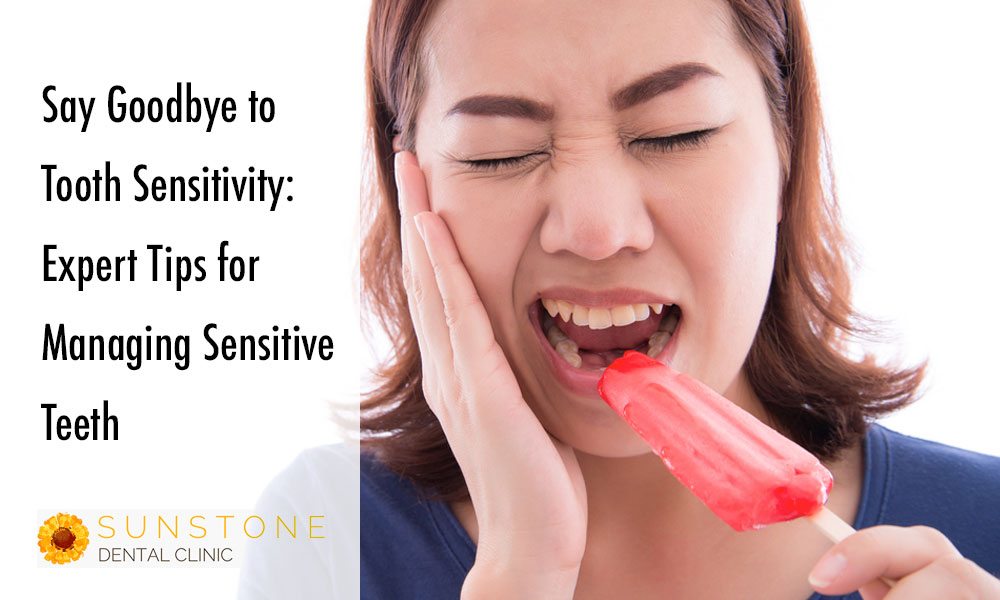Are you tired of wincing every time you take a sip of hot coffee or bite into an ice cream cone? Tooth sensitivity can be a real pain, quite literally. But fear not, because help is at hand. We’ll share expert tips for managing sensitive teeth, so you can bid adieu to that unpleasant sensation for good. Whether you experience sensitivity due to tooth decay, worn enamel, or receding gums, our tips will provide you with actionable solutions to alleviate discomfort and protect your teeth.
What is tooth sensitivity?
Tooth sensitivity is when teeth hurt or feel uncomfortable with certain things like hot, cold, sweet, or acidic foods and drinks. It’s a common problem for people of all ages and can range from a little twinge to severe pain. It happens when the layer under the tooth enamel, called dentin, gets exposed. Dentin has tiny tubes that connect to the nerves in your teeth. When things like hot or cold foods reach these nerves through the tubes, it can cause sensitivity. Knowing what causes tooth sensitivity helps in managing and preventing it.
Causes of tooth sensitivity
- Tooth Decay: Dental caries, or tooth decay, is a leading cause of sensitivity. When plaque buildup or acid erosion damages the enamel, the protective outer layer of the tooth, the dentin underneath becomes exposed, resulting in sensitivity.
- Worn Enamel: Aggressive tooth brushing, grinding, or a diet high in acidic foods and drinks can lead to worn enamel. As the enamel wears away, the underlying dentin is exposed, making the teeth more sensitive to various stimuli.
- Receding Gums: Gum disease or improper brushing techniques can cause the gums to recede. When the gums pull away from the teeth, the tooth roots become exposed, increasing sensitivity to hot, cold, and sweet substances..
How to prevent tooth sensitivity
To prevent tooth sensitivity, follow these steps:
- Maintain good oral hygiene: Brush your teeth twice daily with a soft-bristled toothbrush and fluoride toothpaste to remove plaque and prevent decay. Remember to brush gently to protect your enamel.
- Floss daily: Removing plaque and food particles from between your teeth and along the gumline reduces the risk of gum disease and receding gums.
- Watch your diet: Avoid excessive consumption of acidic foods and beverages, and try to minimize exposure to hot and cold temperatures. Using a straw with acidic drinks can help protect your teeth.
- Regular dental check-ups: Visit your dentist regularly for check-ups and professional cleanings. This helps identify and address any dental issues before they worsen and lead to tooth sensitivity.
Expert tips for managing tooth sensitivity at home
If you have tooth sensitivity, there are ways to help:
- Use desensitizing toothpaste: These toothpastes block pain signals to nerves by filling in tiny holes in the teeth. Use them regularly for a few weeks for best results.
- Try fluoride gel or varnish: Applying fluoride to sensitive areas can strengthen enamel and reduce sensitivity.
- Choose gentle oral care: Use a softer toothbrush and avoid harsh toothpaste to prevent further damage to sensitive teeth.
- Keep up with good oral hygiene: Brush and floss properly to help manage tooth sensitivity.
Dental treatments for tooth sensitivity
If home remedies don’t ease tooth sensitivity, dental treatments might be needed:
- Dental sealants: Thin plastic coatings are applied to teeth to shield enamel and lessen sensitivity.
- Bonding: A tooth-coloured resin is applied to sensitive areas to cover and safeguard exposed dentin.
- Dental crowns or inlays: These provide extra protection and support, especially for severe sensitivity.
- Root canal: In rare cases, when other treatments fail, a root canal procedure may be necessary to address the root cause of sensitivity.
Conclusion
Tooth sensitivity can be tough, but you don’t have to deal with it alone. Understand what causes it and take steps like keeping your mouth clean and trying home remedies. For more serious cases, dental treatments might be needed. Talk to a dentist to figure out the best plan for you. Say goodbye to sensitivity and call Sunstone Dental Clinic at (604) 428-8722 to book an appointment.

